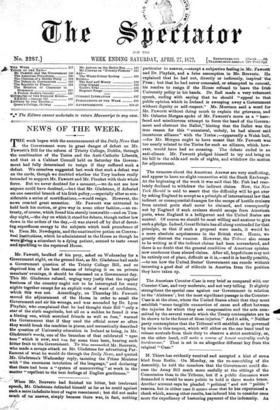' When Mr. Bouverie had finished his bitter, but irrelevant
speech, Mr. Gladstone defended himself as far as he could against such a mere indefinite buzz of vague resentment ; but did not make much of ne answer, simply because there was, in fact, nothing particular to answer,—except a subjective feeling in Mr. Fawcett and Dr. Playfair, and a false assumption in Mr. Bonvetie. He explained that he had not, directly or indirectly, inspired the Press ; but that he had never concealed, or attempted to conceal, his resolve to resign if the House refused to leave the Irish University policy in his hands. Dr. Ball made a very vehement speech, ending with saying that he should "appeal to that public opinion which in Ireland is sweeping away a Government without dignity or self-respect." Mr. Morrison said a word for Mr. Fawcett without doing much to explain the grievance, and Mr. Osborne Morgan spoke of Mr. Fawcett's move as a "bare- faced and mischievous attempt to force the hand of the Govern- ment and obstruct the Ballot," hinting that the Ballot was the true reason for this "unnatural, unholy, he had almost said incestuous alliance" with the Tories ;—apparently a Welsh bull, —for Mr. Morgan ought to have meant that Mr. Fawcett was too nearly related to the Tories for such an alliance, which, how- ever, would have had no meaning. The debate ended in an anti-climax. Mr. Fawcett pledged himself to try and bring on his bill in the odds and ends of nights, and withdrew the motion for adjournment.


































